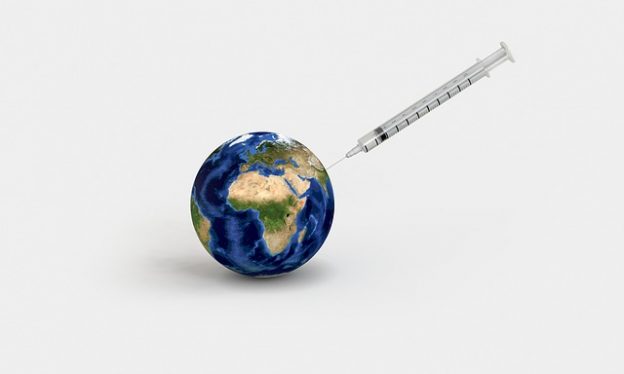Vaccines: Heat-stable versions saves money, protects more people according to MSF study
Replacing the standard vaccines currently recommended by the World Health Organization (WHO)—most of which require refrigeration—with heat-stable versions would save money and increase protection of women, children and babies from deadly diseases like pneumonia, diarrhea, tetanus, measles and yellow fever, according to a study by Doctors Without Borders/Médecins Sans Frontiéres (MSF) and the HERMES Logistics Team (consisting of members from the Johns Hopkins Bloomberg School of Public Health and Pittsburgh Supercomputing Center at Carnegie Mellon University) published today in the journal Vaccine. This is the first study to analyze the additional clinical and economic impact of heat-stable vaccines.

Image/qimono via pixabay
The time and resources it would take to make existing vaccines heat-stable, or thermostable, so that they do not need to be stored in refrigerators or carried to patients in containers with ice packs, would be worthwhile because, in addition to increasing access for children who live in resource-limited regions where electricity may be unreliable, insufficient or non-existent, it would also save money in the long-run by reducing medical costs related to infections. Specifically, this study looked at the benefits of making twelve vaccines heat-stable, most of which are recommended by the WHO as part of the standard package recommended for all children through the Expanded Program on Immunization (EPI). Currently, almost all vaccines need to be kept between 35°F to 46°F (2-8°C) from the point of manufacture to the patient, which is a significant logistical challenge in developing countries where cold storage options are limited and electricity is scarce.
“It’s common sense—some of the children most in need of these lifesaving vaccines live in places where health care is already hard to access,” said Julien Potet, neglected tropical diseases and vaccines advisor at MSF’s Access Campaign. “By making vaccines that are easier to transport in places like Benin, India and Niger, we can save more lives and improve public health. This study shows that the argument against investing in heat-stable vaccines isn’t viable. Working to make existing vaccines thermostable will actually save money in the long-run by reducing the need for future medical care for infections from these vaccine-preventable diseases.”
The modeling study used the Highly Extensible Resource for Modeling Event-Driven Supply Chains (HERMES) software to construct simulation models of vaccine supply chains—including the conditions in which they were stored and administered, the type of container they were stored in and how they were shipped and transported. It ran detailed simulations of how the supply chain would be affected, how vaccine availability in health centers would be improved and how disease burdens would be decreased over the course of a year when a vaccine was made heat-stable. The simulation, which analyzed how heat-stable vaccines would perform in Benin, India and Niger, also looked at the money that would be saved in logistics costs associated with keeping vaccines cool and medical costs by preventing infections in the first place. Acknowledging that pharmaceutical companies may charge more for vaccines if they invest in making them heat-stable, the study also analyzed the benefits if a heat-stable vaccine cost doubled or tripled in its current price.
The study focused on several standard vaccines, including the BCG tuberculosis vaccine, measles vaccine, oral polio vaccine, pneumococcal conjugate vaccine, pentavalent vaccine, tetanus toxoid vaccine, yellow fever vaccine and rotavirus vaccine.
The majority of currently available vaccines must be kept cold at all times or they may degrade, making the product less effective. Maintaining constant refrigeration of vaccines in developing countries that have scarcity of cold storage and face supply chain challenges is a significant obstacle to reaching children in need. However, heat-stable vaccines could make a significant difference. For example, this study found that a heat-stable pneumonia vaccine could increase overall vaccine availability to 86 percent in Benin, compared to the 80 percent baseline availability of all vaccines in Benin. Additionally, the study found an overall increase to 56 percent (baseline availability is 50 percent) and to 58 percent (baseline availability is 46 percent) in India and Niger, respectively.
In addition to lowering the medical costs of treating infections, heat-stable vaccines would help prevent infections and increase life expectancy. It would also help improve productivity by preventing illnesses during adulthood that could force people to quit their jobs, which impacts local economies. For example, the study found that replacing the current pentavalent vaccine with a heat-stable formula could save up to $10,945 per 100 people in Niger.
“Medical care providers like MSF constantly struggle with the task of keeping vaccines cool en route to patients in resource-limited settings where infrastructure is weak and there’s no power supply or it’s unreliable,” Potet said. “In some of the most remote parts of the world, our staff on the ground hand-carry vaccines across rough paths, on the backs of motorbikes and over river crossings, in order to reach patients who need them. This task would not only be significantly easier if vaccines were thermostable, but this study shows that the economic and medical gains would be great.”
Previous studies have shown that replacing existing vaccines with heat-stable versions reduces bottlenecks in the vaccine supply chain and increases availability. There are also fewer vaccines wasted with heat-stable vaccines because they don’t go bad when taken out of the cold chain.The HERMES Logistics Team, which includes the Global Obesity Prevention Center (GOPC) at Johns Hopkins University, Johns Hopkins Bloomberg School of Public Health, and Pittsburgh Supercomputing Center (PSC) at Carnegie Mellon University contributed to the study.
Related:
- Vaccines: An interview with Dr. Paul Offit
- Vaccines: 450K deaths in the US prevented thanks to 1962 breakthrough, according to study
- Vaccines are safe. Vaccines are effective. Vaccines save lives. –Letter to President Trump
- Vaccines: Myths, misinformation and safety concerns contribute to ‘Vaccine hesitancy’
- Malaria vaccine: Ghana, Kenya and Malawi to take part in WHO pilot program
- Tiny silica ‘cages’ could keep vaccines safe at high temperatures
- The first live-attenuated vaccine candidate completely protects against Zika infection
- Ebola vaccines provide immune responses after 1 year














